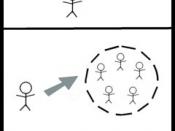As the use of teams within organizations is increasing, there are some potential problems that arise from a group setting. One of the inherent problems, particularly more pronounced as teams get larger, is the phenomenon of social loafing (Feldman, 1985, pg. 234). Social loafing describes the phenomenon that individuals are more likely to exert less effort when working as a group than working as an individual. Such dysfunction in group dynamics within individuals impairs team effectiveness; and mitigates creativity and cohesion (Colquit, Wesson, LePine, 2009, pg. 417).
Owing to the growing importance of teamwork in organizational cultures and settings, the problem of social loafing needs to be understood and addressed effectively. Social loafing occurs because of many reasons: people's perception of other members of the group has an impact on their output, especially if there is a disparity in motivation and skills. A person is less likely to produce optimal performance if he/she believes that others in the group are less motivated or skilled than themselves, thereby reducing their own output.
Also, goal setting is sometimes less ambitious because group members have a tendency to believe that the task will be easier when others are involved. However, the leading cause of social loafing is when individuals feel that their own efforts are not linked or discernable to the outcome in a group setting than when they are alone (Brilhart, 1995, pg. 26).
Understanding some of the sources of social loafing is paramount, but steps must be undertaken that can limit the effect of social loafing within a group. To the extent that individuals lack interest in tasks or goals because they simply feel that their efforts will not be met by others in the group, task designation and assignment takes a more imperative role. Individuals are more likely to contribute...


